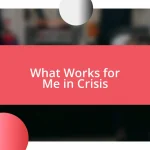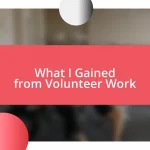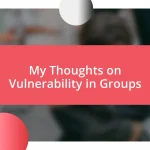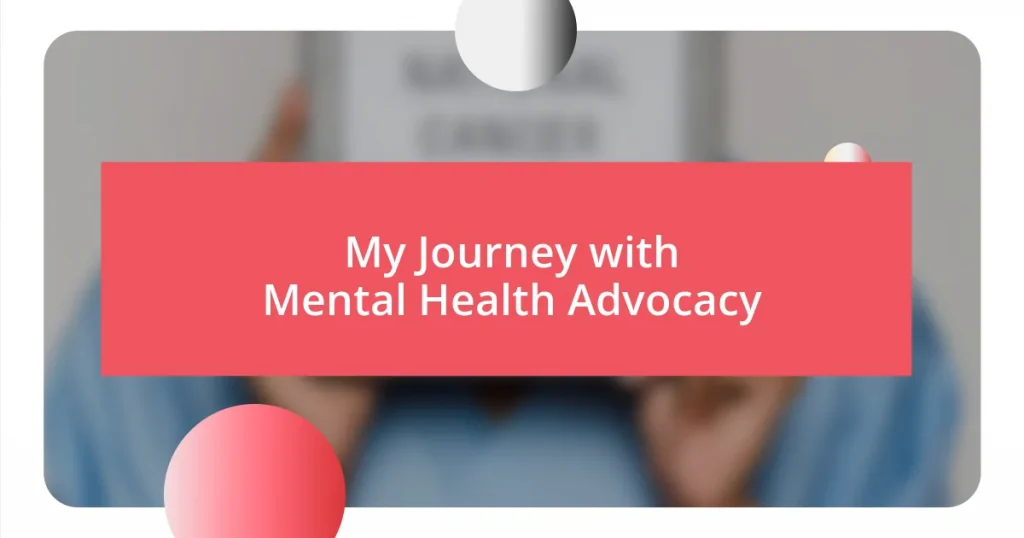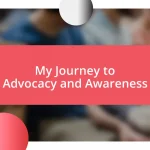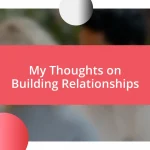Key takeaways:
- Mental health advocacy centers around creating safe spaces for dialogue, reducing stigma, and promoting understanding through personal stories and community engagement.
- Engaging with support groups fosters connection and empathy, while vulnerability leads to empowerment and shared healing experiences.
- Effective advocacy relies on strong communication, the use of diverse platforms for outreach, and collaboration with others to amplify messages and resources.
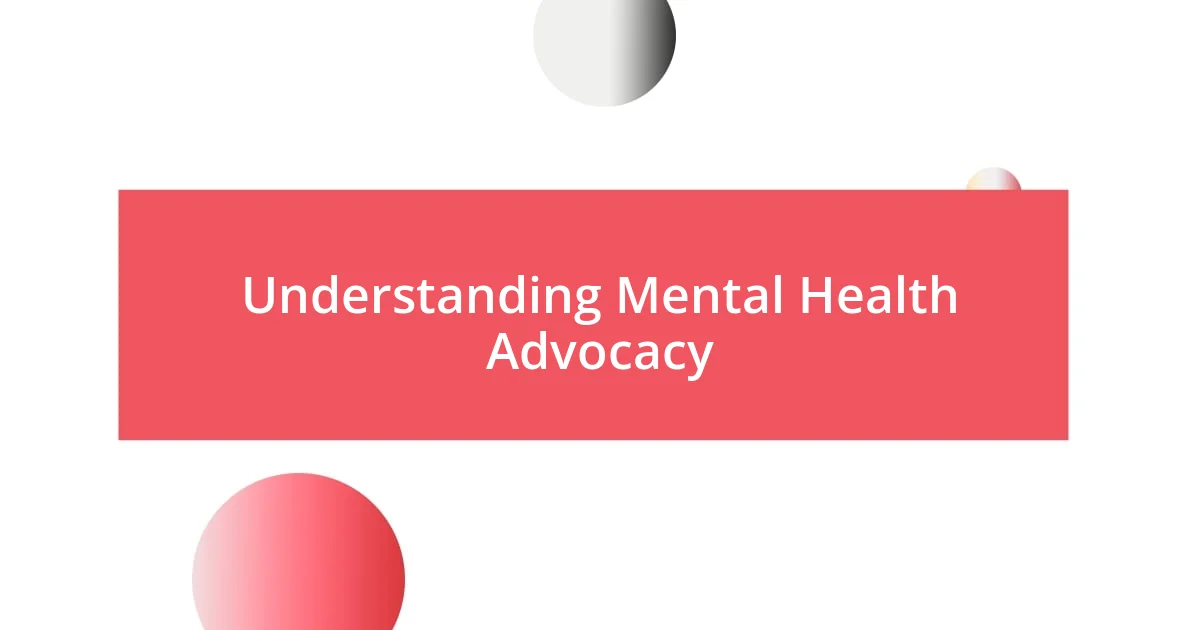
Understanding Mental Health Advocacy
Mental health advocacy is all about amplifying voices that often go unheard. I still remember a moment during a community meeting when someone stood up, trembling, to share their story. That vulnerability underscored just how crucial it is to create safe spaces for people to express their mental health challenges. Can you recall a time when you felt like your voice mattered?
At its core, mental health advocacy seeks to educate the public, reduce stigma, and promote better policies that prioritize mental wellness. I’ve witnessed firsthand how a simple conversation can shift perceptions. For instance, when I shared my story about anxiety with a friend, it not only opened the door for them to discuss their struggles, but it also highlighted how many misconceptions still linger about mental health.
Moreover, advocacy can take many forms, from one-on-one conversations to larger campaigns aimed at influencing policy. I often ask myself, what small step can I take today to support someone struggling with their mental health? Through my experiences, I’ve learned that even the smallest acts—like listening or offering resources—can create ripples of change in someone’s life.
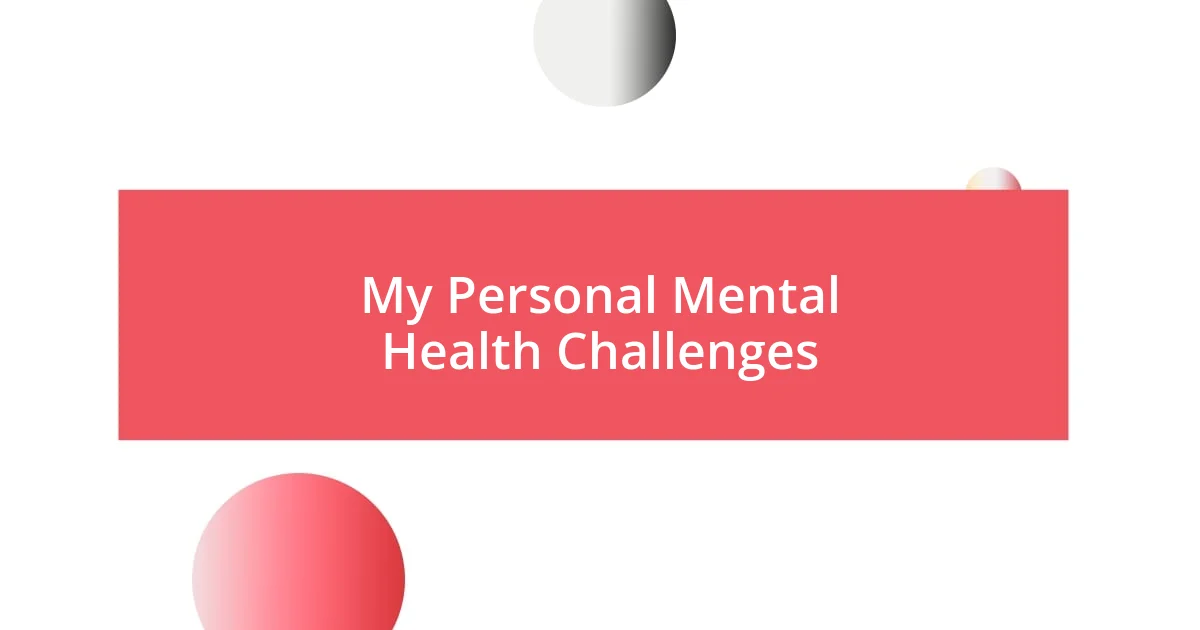
My Personal Mental Health Challenges
Experiencing mental health challenges is something I’ve navigated for years. There were times when my anxiety held me back from participating in social gatherings. Just envision standing in a room full of people, feeling like you’re going to crumble—not fun at all. Over time, I learned that acknowledging these feelings is the first step toward healing.
Another significant challenge I faced was depressive episodes. I recall days when even getting out of bed felt like a monumental task. My world would dim, colors fading to gray, and it was hard to muster the energy to reach out for help. However, during those dark moments, I discovered the importance of connection. Sharing my struggles with a trusted friend brought a spark of light, reminding me that I wasn’t alone in this battle.
I’ve also encountered the hurdles of self-doubt and stigma. There were occasions when I hesitated to seek help, fearing judgment from others. I remember the relief and empowerment I felt when I finally allowed myself to voice that fear in a support group. It made me realize that vulnerability is a strength, and opening up about my mental health challenges has paved the way for deeper connections with those around me.
| Challenge | Emotional Insight |
|---|---|
| Anxiety | Felt paralyzed in social situations, gradually learned to embrace and acknowledge my feelings. |
| Depression | Days became overwhelming; reaching out for help was a transformative moment. |
| Self-doubt & Stigma | Feared judgment, but found strength in vulnerability and support. |
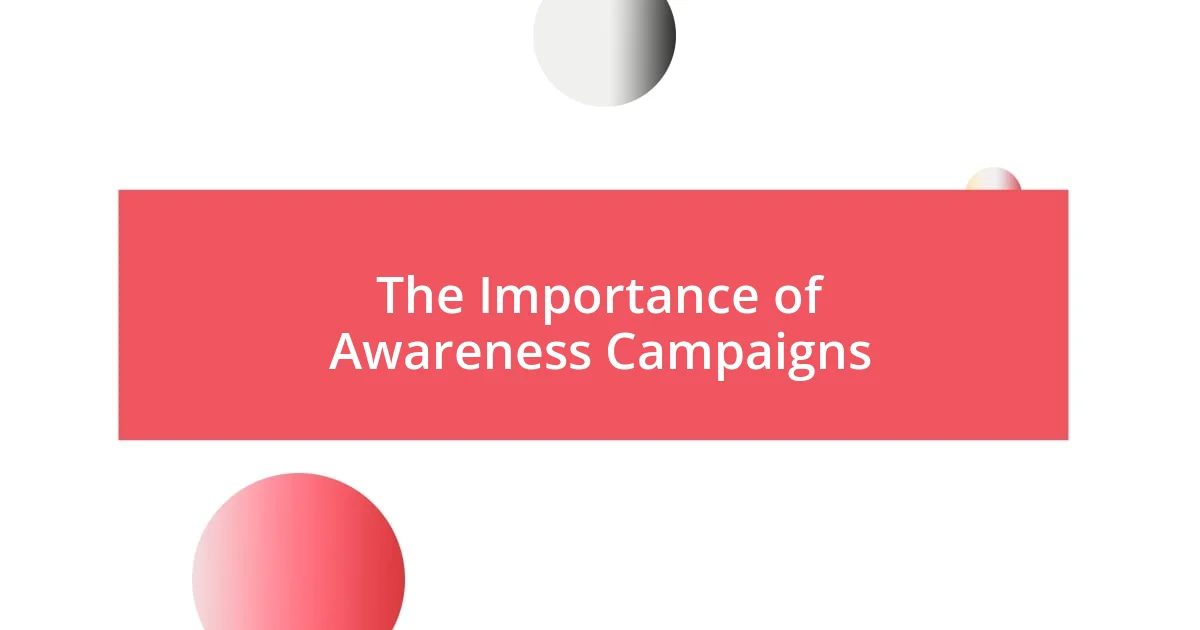
The Importance of Awareness Campaigns
Awareness campaigns are essential in the realm of mental health advocacy, as they play a critical role in challenging stigma and promoting understanding. I’ll never forget the campaign I participated in during Mental Health Awareness Month. It was exhilarating to see how such initiatives spark conversations that genuinely resonate with people. When individuals learn about mental health issues through relatable stories, it opens their eyes to the struggles many face daily.
Here are some key reasons why these campaigns are so impactful:
- Educating the Public: They provide valuable insights into mental health conditions, which can dispel myths and misconceptions.
- Creating Safe Spaces: Awareness campaigns encourage individuals to share their stories, fostering an environment where others feel comfortable doing the same.
- Encouraging Support: Such initiatives highlight the importance of reaching out, making it easier for those struggling to seek help.
- Influencing Policy: By raising awareness, these campaigns can lead to changes at the institutional and governmental levels, improving mental health resources and access.
- Building Community: They unite people who identify with similar struggles, creating a sense of belonging and validation.
Every time I see a community come together for a mental health awareness event, it brings me hope. It reminds me of my own journey, where sharing my struggles led to unexpected friendships and support systems. Watching others share their stories in these campaigns is a powerful testament to the healing that can occur when we lift each other up.
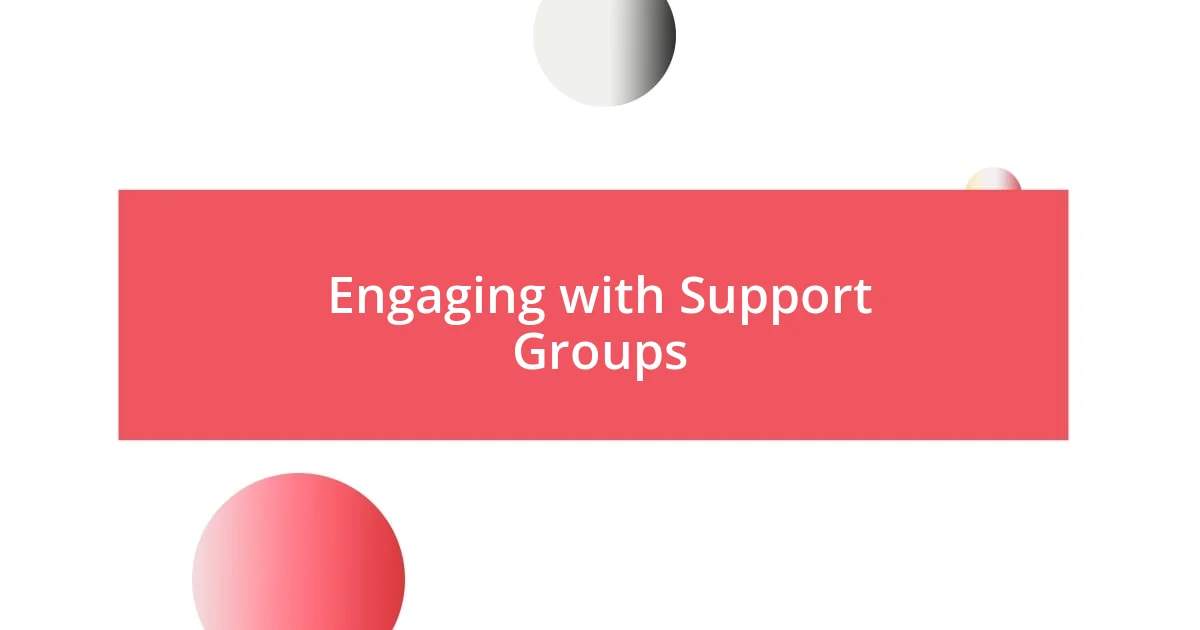
Engaging with Support Groups
Engaging with support groups has been a transformative part of my healing journey. I remember walking into my first group session, my heart racing with nerves. Would anyone understand my pain? Surprisingly, I found solace in shared experiences. Just listening to others express their struggles allowed me to feel like I was part of something bigger, something that validated my own feelings.
Each session brought new lessons, like the importance of active listening. I discovered that being present and hearing others’ stories not only helped me empathize but also eased my own burdens. It’s wild to think about how many times I thought I was alone in feeling hopeless or overwhelmed, only to find that someone else had walked a similar path. Isn’t it fascinating how collective voices can amplify our resilience?
Sometimes, I reflect on the moments of laughter that emerged unexpectedly during discussions. Those light-hearted instances, amidst heavy topics, reminded me that healing doesn’t always have to be solemn. They brought a sense of camaraderie and reminded me of the beauty in connection—even when talking about tough subjects. Engaging with support groups has shown me that vulnerability breeds strength, and together, we can navigate the complexities of mental health.
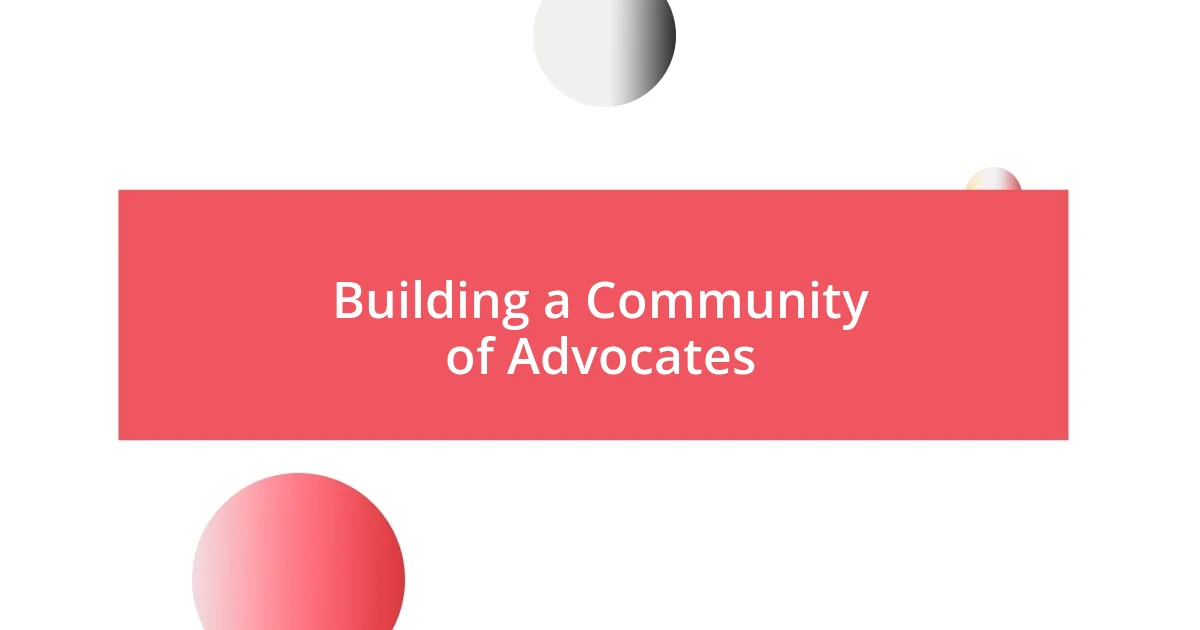
Building a Community of Advocates
Building a community of advocates is incredibly powerful. I recall a time when I hosted a small gathering focused on sharing our mental health experiences. The room was filled with a mix of nerves and excitement, and I realized then the magic that happens when people come together with a common goal. Those conversations, fueled by authenticity and compassion, created bonds stronger than I ever expected.
I’ve noticed how these connections can grow into a support network that extends far beyond the initial meeting. It’s like planting seeds in a garden—each shared story nurtures a sense of belonging. One evening, a member shared how they thought their voice wouldn’t matter. The moment we all encouraged them to speak was profound. That simple act of support transformed their outlook, reinforcing the idea that we’re all in this together. How often do we forget that our experiences can empower others?
Creating this sense of community doesn’t happen overnight; it requires consistency and dedication. I remember starting a monthly meet-up, and the first few sessions felt quiet. However, with time, members began to open up, sharing their challenges and triumphs. It was as if a weight was lifted, and each person’s willingness to be vulnerable inspired others to follow suit. Have you ever witnessed how a safe space evolves into a sanctuary for healing? That’s what building a community is all about—cultivating an environment where love, support, and understanding flourish.
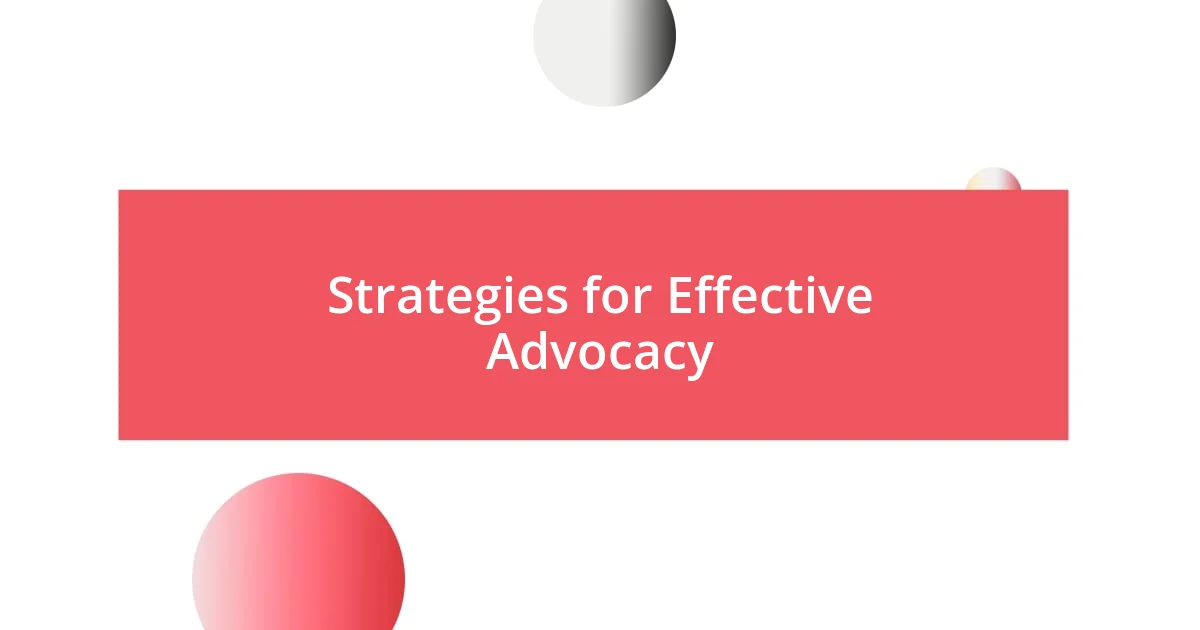
Strategies for Effective Advocacy

Strategies for Effective Advocacy
One of the most effective strategies for advocacy is mastering the art of communication. I remember when I first tried to articulate my mental health struggles to friends and family; finding the right words was daunting. But the more I practiced sharing my story, the clearer my message became. Isn’t it amazing how liberating it feels when you can express yourself authentically? Developing clarity and confidence in your communication can empower not only your voice but others’ as well.
In my journey, I’ve also discovered the importance of using diverse platforms to amplify our message. While attending local events and speaking in support groups has been impactful, sharing my experiences online opened new avenues for connection. One heartfelt post on social media led to conversations with strangers who shared similar battles, reinforcing that we’re not alone. Have you ever thought about how far your voice could reach in the digital space? It’s a reminder that advocacy can thrive in both personal and public spheres.
Lastly, I’ve learned that advocacy is not a solo endeavor; it thrives on collaboration. I recall organizing an awareness campaign where we partnered with local businesses to promote mental health resources. The synergy of our collective efforts created an energy that resonated throughout the community. Isn’t it incredible how teamwork can amplify our impact? By pooling our resources, skills, and stories, we build a stronger front against stigma and foster a culture of understanding.
